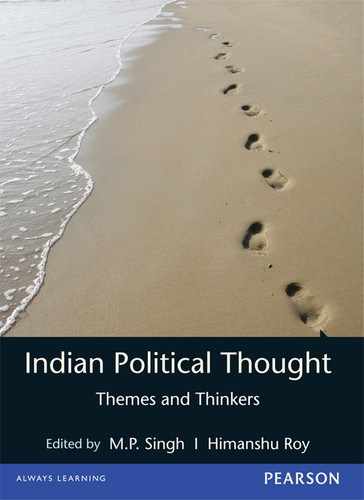0%
47Chapters
0-1Hours read
0kTotal Words
Book Description
Indian Political Thought: Themes and Thinkers covers all major Indian political thinkers from the ancient, through medieval to the modern times. Thus, this book provides an overview of the evolution of the Indian political thought through different historical periods, giving an insight into the sociological and political conditions of the times that shaped the Indian political thinking. It does not only talk about the lives and times of the thinkers, but also explores the important themes that formed the basis of their political ideologies. The chapters discuss the contributions of the thinkers and at the same time examine some important themes including the theory of state, civil rights, ideal polity, governance, nationalism, democracy, social issues like gender and caste, swaraj, satyagraha, liberalism, constitutionalism, Marxism, socialism and Gandhism. With a comprehensive coverage of both the thinkers and the themes of the Indian political thought, this book caters to needs of the undergraduate as well as the post graduate courses of all Indian universities. It is valuable also for UGC-NET and civil service examinations.Table of Contents
- Cover
- Title Page
- Contents
- About the Editors and Contributors
- Preface
- Introduction
- Chapter 1. Kautilya: Theory of State
- Chapter 2. Manu: Social Laws
- Chapter 3. Zia Barani: Good Sultan and Ideal Polity
- Chapter 4. Abul Fazl: Governance and Administration
- Chapter 5. Rammohan Roy: Civil Rights
- Chapter 6. Jotirao Phule: Social Justice
- Chapter 7. Vivekanand: Cultural Nationalism
- Chapter 8. Aurobindo: Nationalism and Democracy
- Chapter 9. Ramabai: Gender and Caste
- Chapter 10. Gandhi: Swaraj and Satyagraha
- Chapter 11. Jinnah: Liberal Constitutionalism and Islam
- Chapter 12. Savarkar: Hindutva and Critique of Caste System
- Chapter 13. Nehru: Ideas of Development
- Chapter 14. M. N. Roy: Twentieth-Century Renaissance
- Chapter 15. Periyar: Radical Liberalism
- Chapter 16. Ambedkar: Constitutionalism and State Structure
- Chapter 17. Ambedkar: Democracy and Economic Theory
- Chapter 18. Lohia: Democracy
- Chapter 19. Jayaprakash Narayan: Marxism, Democratic Socialism and Gandhism
- Notes
- Copyright
